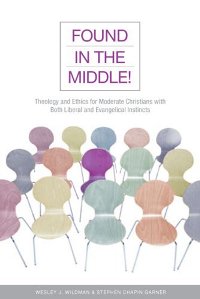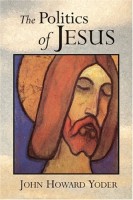
Found in the Middle!: Theology and Ethics for Christians Who are both Liberal and Evangelical by Wesley J. Wildman & Stephen Chapin Garner
In Lost in the Middle? Wesley J. Wildman and Stephen Chapin Garner articulated a moderate form of Christian faith that makes sense for many moderate Christians with simultaneously liberal and evangelical instincts. Lost challenged Liberal-Evangelical Christians to preach a gospel of radically inclusive, Christ-centeredness. But what precisely does such a gospel message look like? What does it entail for theology, ethics, and ecclesiology? The purpose of Found in the Middle! is to answer these questions.
Found is a practically useful and theologically rich guide book for moderate Christians of the liberal-evangelical sort, and for the church communities that such Christians build and nurture together.
Here is how Found states its purpose.
[The book] focuses on the problems that arise when Christians of this passionately moderate sort find each other and gather together in congregations. Their churches intentionally aim to model for the world a kind of community that rises above territorial instincts and insults, one that stresses love and acceptance more than cultural identity and security. But that is no easy calling. It is bracing to worship beside someone with a completely opposite view on legal access to abortion and economic and taxation policy, to know that you disagree, and yet still to find love and acceptance together at the Communion table. But sooner or later you have to talk meaningfully with your political and ethical opponent, whom you strive to love and respect. Your church needs a theological and ethical self-understanding that everyone can sign on to or it will pull apart.
How can intentionally moderate communities find a “humble theology, an intelligible gospel message, a compelling view of church unity, and a radical ethics that are deeply satisfying to most Christians with both liberal and evangelical instincts”? Found offers helpful guiding principles towards this end.
God’s greatness demands our humility. We should not make God a servant of our moral and ideological agenda’s. We must avoid the idolatry of taming God.
God was in Christ reconciling the world. We can hold on to this belief without dividing over doctrinal details that are secondary to it.
We can engage church conflicts courteously without taking them too far, if we cultivate a better approach to disagreements. Christian unity can include tolerance of disagreement if Christ-like love is held in higher regard than rigid doctrinal pursuits.
Spirituality, discipleship, and Christian morality are best understood under the principle of Christ-centered radical inclusiveness.
The book closes with a seven-point guide for congregations of liberal-evangelical Christians seeking to cultivate unity while treasuring diversity.
Order Found in the Middle! using the link on the right side of the home page. Check out the Alban Institute’s article on this newly released book.


